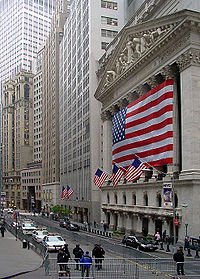New York Stock Exchange ( NYSE )
New York Stock Exchange (English. New York Stock Exchange, NYSE) - the main US stock exchange, the world's largest. A symbol of the financial power of the United States and the financial industry in general. The stock exchange calculates the world-famous Dow Jones index for shares of industrial companies (English. Dow Jones Industrial Average), as well as the NYSE Composite Index. History Exchange formed 17 May 1792 of the year, when 24 new york broker, who worked with financial instruments and concluded transactions, like their London colleagues, in coffee shops (the most popular coffee house "Tontin"), signed the "Sycamore Agreement" (Buttonwood Agreement) on the establishment of the New York Stock Exchange. With 1975 of the year became a non-profit corporation, owned by their 1366 individual members (this number is constant with 1953 of the year). Members' seats may be for sale, the price of one seat now reaches up to 3 million US dollars.
